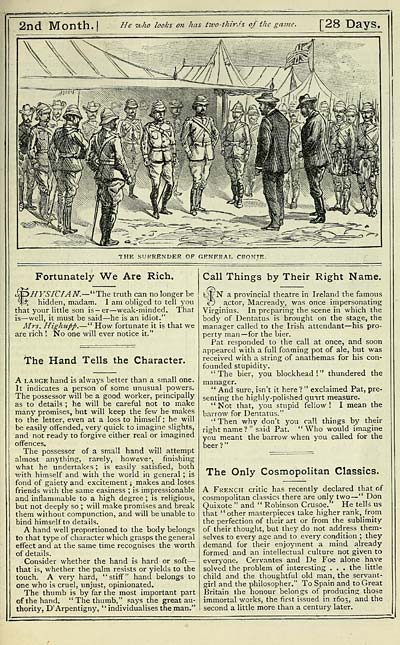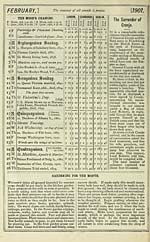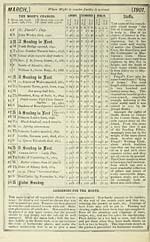Download files
Complete book:
Individual page:
Thumbnail gallery: Grid view | List view

2nd Month. ) ^^^ "^^^o looks on has two-ihirJs of the game. [28 DayS,
THE SURRENDER OF GENERAT, CRONJE.
Fortunately We Are Rich.
ip/rF5'/C/^iV.— "The truth can no longer be
"-i^ hidden, madam. I am obliged to tell you
that your little son is— er — weak-minded. That
is — well, it must be said — he is an idiot."
Mrs. Highupp. — " How fortunate it is that we
are rich ! No one will ever notice it."
The Hand Tells the Character.
A LARGE hand is always better than a small one.
It indicates a person of some unusual powers.
The possessor will be a good worker, principally
as to details ; he will be careful not to make
many promises, but will keep the fev/ he makes
to the letter, even at a loss to himself; he will
be easily offended, very quick to imagine slights,
and not ready to forgive either real or imagined
offences.
The possessor of a small hand will attempt
almost anything, rarely, howeve', finishing
what he undertakes ; is easily satisfied, both
v/ith himself and with the world in general ; is
fond of gaiety and excitement ; makes and loses
friends with the same easiness ; is impressionable
and inflammable to a high degree ; is religious,
but not deeply so ; will make promises and break
them without compunction, and will be unable to
bind himself to details.
A hand well proportioned to the body belongs
to that type of character which grasps the general
effect and at the same time recognises the worth
of details.
Consider whether the hand is hard or soft —
that is, whether the palm resists or yields to the
touch. A very hard, "stiff" hand belongs to
one who is cruel, unjust, opinionated.
The thumb is by far the most important part
of the hand. "The thumb," says the great au-
thority, D'Arpentigny, " individualises the man."
Call Things by Their Right Name.
ijjfr N a provincial theatre in Ireland the famous
O actor, Macready, was once impersonating
Virginius. In preparing the scene in which the
body of Dentatus is brought on the stage, the
manager called to the Irish attendant— his pro-
perty man— for the bier.
Pat responded to the call at once, and soon
appeared with a full foaming pot of ale, but was
received with a string of anathemas for his con-
founded stupidity.
"The bier, you blockhead!" thundered the
manager.
" And sure, isn't it here ? " exclaimed Pat, pre-
senting the highly-polished qmrt measure.
"Not that, you stupid fellow! I mean the
barrow for Dentatus."
"Then why don't you rail things by their
right name ?" said Pat. "Who would imagine
you meant the barrow when you called for the
beer ? "
The Only Cosmopolitan Classics.
A French critic has recently declared that of
cosmopolitan classics there are only two—" Don
Quixote " and " Robinson Crusoe. ' He tells us
that "other masterpieces take higher rank, from
the perfection of their art or from the sublimity
of their thought, but they do not address them-
selves to every age and to every condition ; they
demand for their enjoyment a mind already
formed and an intellectual culture not given to
everyone. Cervantes and De Foe alone have
solved the problem of interesting . . . the little
child and the thoughtful old man, the servant-
girl and the philosopher." To Spain and to Great
Britain the honour belongs of producing those
immortal works, the first issued in 1605, and the
second a little more than a century later.
THE SURRENDER OF GENERAT, CRONJE.
Fortunately We Are Rich.
ip/rF5'/C/^iV.— "The truth can no longer be
"-i^ hidden, madam. I am obliged to tell you
that your little son is— er — weak-minded. That
is — well, it must be said — he is an idiot."
Mrs. Highupp. — " How fortunate it is that we
are rich ! No one will ever notice it."
The Hand Tells the Character.
A LARGE hand is always better than a small one.
It indicates a person of some unusual powers.
The possessor will be a good worker, principally
as to details ; he will be careful not to make
many promises, but will keep the fev/ he makes
to the letter, even at a loss to himself; he will
be easily offended, very quick to imagine slights,
and not ready to forgive either real or imagined
offences.
The possessor of a small hand will attempt
almost anything, rarely, howeve', finishing
what he undertakes ; is easily satisfied, both
v/ith himself and with the world in general ; is
fond of gaiety and excitement ; makes and loses
friends with the same easiness ; is impressionable
and inflammable to a high degree ; is religious,
but not deeply so ; will make promises and break
them without compunction, and will be unable to
bind himself to details.
A hand well proportioned to the body belongs
to that type of character which grasps the general
effect and at the same time recognises the worth
of details.
Consider whether the hand is hard or soft —
that is, whether the palm resists or yields to the
touch. A very hard, "stiff" hand belongs to
one who is cruel, unjust, opinionated.
The thumb is by far the most important part
of the hand. "The thumb," says the great au-
thority, D'Arpentigny, " individualises the man."
Call Things by Their Right Name.
ijjfr N a provincial theatre in Ireland the famous
O actor, Macready, was once impersonating
Virginius. In preparing the scene in which the
body of Dentatus is brought on the stage, the
manager called to the Irish attendant— his pro-
perty man— for the bier.
Pat responded to the call at once, and soon
appeared with a full foaming pot of ale, but was
received with a string of anathemas for his con-
founded stupidity.
"The bier, you blockhead!" thundered the
manager.
" And sure, isn't it here ? " exclaimed Pat, pre-
senting the highly-polished qmrt measure.
"Not that, you stupid fellow! I mean the
barrow for Dentatus."
"Then why don't you rail things by their
right name ?" said Pat. "Who would imagine
you meant the barrow when you called for the
beer ? "
The Only Cosmopolitan Classics.
A French critic has recently declared that of
cosmopolitan classics there are only two—" Don
Quixote " and " Robinson Crusoe. ' He tells us
that "other masterpieces take higher rank, from
the perfection of their art or from the sublimity
of their thought, but they do not address them-
selves to every age and to every condition ; they
demand for their enjoyment a mind already
formed and an intellectual culture not given to
everyone. Cervantes and De Foe alone have
solved the problem of interesting . . . the little
child and the thoughtful old man, the servant-
girl and the philosopher." To Spain and to Great
Britain the honour belongs of producing those
immortal works, the first issued in 1605, and the
second a little more than a century later.
Set display mode to: Large image | Transcription
Images and transcriptions on this page, including medium image downloads, may be used under the Creative Commons Attribution 4.0 International Licence unless otherwise stated. ![]()
| Scottish Post Office Directories > Towns > Forfar > Forfar directory and year book > 1901 > (97) |
|---|
| Permanent URL | https://digital.nls.uk/85640797 |
|---|
| Description | Forfar : W. Shepherd, 1884- |
|---|---|
| Description | Directories of individual Scottish towns and their suburbs. |
|---|
| Description | Around 700 Scottish directories published annually by the Post Office or private publishers between 1773 and 1911. Most of Scotland covered, with a focus on Edinburgh, Glasgow, Dundee and Aberdeen. Most volumes include a general directory (A-Z by surname), street directory (A-Z by street) and trade directory (A-Z by trade). |
|---|


